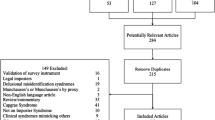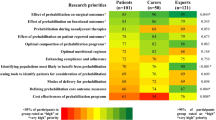Abstract
With the coalescing of Europe, increased mobility of professionals emerges. Initiatives to harmonize medical education were launched. In Otolaryngology, Head and Neck surgery (ORL) an European board examination was created to ensure standards. Quality of training, satisfaction and quality of life of residents and recent ORL specialists were compared to assess different aspects of work and hierarchical relationships in France (FRA) and Germany (GER) by means of an anonymous questionnaire. 120 FRA and 125 GER questionnaires were included. 78 % of respondents were residents. 86 % would choose the same training again. In both countries, a majority felt well considered with responsibilities adapted to their level of training and with supportive supervisors. Germans reported average daily work hours of 9.6 versus 11 in FRA with compensated overtime (76 %) and a possibility of part-time work (62 %), both nearly inexistent in FRA. In GER, the day-off after duty was more often respected. French attributed their seniors better pedagogic skills, taking time for explanations and providing better teaching. Offering a good training was a more important objective in French training centers (77 vs. 51 %). In both countries, surgical training relied on coaching. Research activities were comparable. The overall satisfaction with ORL training was high. Differences concerned structure of training, guidance by senior doctors and the working conditions. The study results provide guidance before choosing a program and may help to improve current training by identifying positive aspects that, if combined could lead to a convergence of programs. However, present high standards of education must be maintained.
Similar content being viewed by others
References
Anonymous http://www.conseil-national.medecin.fr
Anonymous http://www.gbe-bund.de
Anonymous (2009) Projekt “Evaluation der Weiterbildung”. http://www.bundesaerztekammer.de
Arah OA, Heineman MJ, Lombarts KM (2012) Factors influencing residents’ evaluations of clinical faculty member teaching qualities and role model status. Med Educ 46(4):381–389. doi:10.1111/j.1365-2923.2011.04176.x
Arora S, Aggarwal R, Sirimanna P et al (2011) Mental practice enhances surgical technical skills: a randomized controlled study. Ann Surg 253:265–270
Aziz SR, Ziccardi VB, Chuang SK (2013) Training satisfaction versus dissatisfaction among chief residents in oral and maxillofacial surgery—a pilot survey. J Oral Maxillofac Surg 71(5):974–980. doi:10.1016/j.joms.2011.12.004
Black SA, Nestel D, Tierney T et al (2009) Gaining consent for carotid surgery: a simulation-based study of vascular surgeons. Eur J Vasc Endovasc Surg 37:134–139
Bold RJ (2005) A young surgeon’s perspective. Arch Surg 140(3):254–257. doi:10.1001/archsurg.140.3.254
Cannon CR, Giaimo EM, Lee TL et al (2004) Special report: reassessment of the ORL-HNS workforce: perceptions and realities. Otolaryngol Head Neck Surg 131:1–15
Capozzi JD, Rhodes R (2000) Residency training. J Bone Joint Surg Am 82:1356–1357
Carter FJ, Schijven MP, Aggarwal R et al (2005) Consensus guidelines for validation of virtual reality surgical simulators. Surg Endosc 19:1523–1532
Coates KW, Kuehl TJ, Bachofen CG et al (2001) Analysis of surgical complications and patient outcomes in a residency training program. Am J Obstet Gynecol 184:1380–1383 discussion 1383–1385
Crochet P, Aggarwal R, Dubb SS et al (2011) Deliberate practice on a virtual reality laparoscopic simulator enhances the quality of surgical technical skills. Ann Surg 253:1216–1222
Cyr-Taro AE, Kotwall CA, Menon RP, Hamann MS, Nakayama DK (2008) Employment and satisfaction trends among general surgery residents from a community hospital. J Surg Educ 65(1):43–49. doi:10.1016/j.jsurg.2007.07.004
Czeisler CA (2006) The Gordon Wilson Lecture: work hours, sleep and patient safety in residency training. Trans Am Clin Climatol Assoc 117:159–188
Farnworth LR, Lemay DE, Wooldridge T et al (2001) A comparison of operative times in arthroscopic ACL reconstruction between orthopaedic faculty and residents: the financial impact of orthopaedic surgical training in the operating room. Iowa Orthop J 21:31–35
Golub JS, Weiss PS, Ramesh AK et al (2007) Burnout in residents of otolaryngology-head and neck surgery: a national inquiry into the health of residency training. Acad Med 82:596–601
Van Der Horst MS K, Orlow P, Berendonk C, Giger M (2010) Résultats de l’enquête 2008 auprès des médecins-assistants: démographie, appréciation des études et de la culture de feed-back dans les établissements de formation postgraduée. Bulletin des médecins suisses No 6(91):96
Kneebone R, Baillie S (2008) Contextualized simulation and procedural skills: a view from medical education. J Vet Med Educ 35:595–598
Lavernia CJ, Sierra RJ, Hernandez RA (2000) The cost of teaching total knee arthroplasty surgery to orthopaedic surgery residents. Clin Orthop Relat Res 380:99–107
Nadol JB Jr (1999) Training the physician-scholar in otolaryngology-head and neck surgery. Otolaryngol Head Neck Surg 121:214–219
Neacy K, Stern SA, Kim HM et al (2000) Resident perception of academic skills training and impact on academic career choice. Acad Emerg Med 7:1408–1415
Nestel DF, Black SA, Kneebone RL et al (2008) Simulated anaesthetists in high fidelity simulations for surgical training: feasibility of a training programme for actors. Med Teach 30:407–413
Pillsbury HC, Cannon CR, Sedory Holzer SE et al (2000) The workforce in otolaryngology-head and neck surgery: moving into the next millennium. Otolaryngol Head Neck Surg 123:341–356
Staveley-O’carroll K, Pan M, Meier A et al (2004) Developing the young academic surgeon. J Surg Res 118:109–113
Upton D, Mason V, Doran B et al (2012) The experience of burnout across different surgical specialties in the United Kingdom: a cross-sectional survey. Surgery 151:493–501
Yaegashi N, Kuramoto M, Nakayama C et al (1996) Resident gynecologists and total hysterectomy. Tohoku J Exp Med 178:299–306
Zendejas B, Cook DA, Bingener J, Huebner M, Dunn WF, Sarr MG, Farley DR (2011) Simulation-based mastery learning improves patient outcomes in laparoscopic inguinal hernia repair: a randomized controlled trial. Ann Surg 254(3):502–509 (discussion 509–511). doi:10.1097/SLA.0b013e31822c6994
Conflict of interest
The authors have no conflict of interest to declare.
Author information
Authors and Affiliations
Corresponding author
Electronic supplementary material
Below is the link to the electronic supplementary material.
Rights and permissions
About this article
Cite this article
Oker, N., Escabasse, V., Pensky, H. et al. Training satisfaction and work environment in Otorhinolaryngology, Head and Neck surgery: a comparison between France and Germany. Eur Arch Otorhinolaryngol 271, 2565–2573 (2014). https://doi.org/10.1007/s00405-014-3046-y
Received:
Accepted:
Published:
Issue Date:
DOI: https://doi.org/10.1007/s00405-014-3046-y




